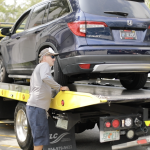There is a lot of hype and speculation about the future of self-driving vehicles. While many believe that they could make roads safer, others believe that the technology isn’t ready to be deployed to the masses. Let’s take a look at the state of autonomous driving and whether the next generation of vehicles can truly disrupt the love affair that people have with their cars.
Yes, but No
According to this source, one in every twenty-five drivers reports having fallen asleep while driving in the past thirty days. It is believed that self-driving vehicles will allow people to take naps in their cars without putting themselves or others in danger. However, advanced autopilot features likely are the best that drivers can hope for in the short term. It is more likely that truly self-driving cars will be used as delivery vehicles or to provide transportation in limited areas, such as on college and hospital campuses.
Are Self-Driving Cars Even Safe?
According to this source, skeptics of autonomous and self-driving car technology say that anything made by humans is prone to failure. However, these types of vehicles are likely to be safer than those that people control on their own. This is because most accidents are the result of human error, such as driving while tired, distracted or impaired. Humans are also likely to travel at speeds that are too fast for road conditions. By taking people out of the driver’s seat, those types of mistakes will not be able to happen.
What Are the Current Limitations of Self-Driving Cars?
One of the issues with adopting self-driving technology is that there will still be cars on the highway that are controlled by people. Therefore, it may be necessary to keep a human behind the wheel of a vehicle regardless of its level of sophistication. This is because only a human will truly be able to understand what another person is thinking. Unless computers can learn human psychology, self-driving cars can’t be available to the masses until they are the only type of vehicles on the road.
Can Self-Driving Cars End Accidents?
There is a significant push to eliminate traffic accidents, and this source says that getting rid of the mistake-prone human element in driving could be a huge step toward achieving that goal. However, there is still the potential for cars and other vehicles controlled by robots to get into collisions. Of course, these collisions are likely to be at lower speeds, which could reduce their severity. If car accidents are eliminated entirely, it could have a number of positive impacts for both drivers and pedestrians. For instance, parents may feel better about letting their children walk home from school each day, and the cost of car insurance will go down dramatically.
While fully self-driving vehicles may not necessarily be on the horizon, vehicles will continue to evolve toward that goal, which will change the world as we know it once it’s achieved. In the meantime, vehicles are likely to become smarter, safer and more connected than ever before. However, it’s still important that you keep your focus on the road when driving to ensure your safety and the safety of others sharing that road with you.





Comments by Direct Connect Auto Transport